John Peter Zenger Trial: 1735
Hamilton's Appeal For Press Freedom
Since he was unable to present his evidence, Hamilton's only chance to acquit his client was through his summation to the jury. He began by pointing out that "the suppression of evidence ought always to be taken for the strongest
 On November 2, 1734, Royal Governor Cosby ordered four issues of Zenger's Weekly Journal burned.
On November 2, 1734, Royal Governor Cosby ordered four issues of Zenger's Weekly Journal burned.
I am truly very unequal to such an undertaking on many accounts. And you see I labor under the weight of many years, and am borne down with great infirmities of body; yet old and weak as I am, I should think it my duty, if required, to go to the utmost part of the land where my service could be of any use in assisting to quench the flame of persecutions upon informations set on foot by the government to deprive a people of the right of remonstrating of the arbitrary attempts of men in power. Men who injure and oppress the people under their administration provoke them to cry out and complain; and then make that very complaint the foundation for new oppressions and prosecutions.… Gentlemen of the jury, … it is not the cause of a poor printer, nor of New York alone, which you are now trying. No! It may in its consequences affect every freeman that lives under a British government on the main of America. It is the best cause. It is the cause of liberty; and I make no doubt but your upright conduct this day will not only entitle you to the love and esteem of your fellow citizens, but every man who prefers freedom to a life of slavery will bless you and honor you, as men who have baffled the attempt of tyranny.
This spellbinding summation, one of the most famous and memorable in legal history, emboldened jurymen and spectators alike. As Zenger himself later noted: "The jury withdrew, and in a small time returned, being asked by the clerk whether they were agreed of their verdict, and whether John Peter Zenger was guilty of printing and publishing the libels in the information aforementioned, they answered by Thomas Hunt, their foreman: Not Guilty. Upon which there were three huzzas in the hall, which was crowded with people and the next day I was discharged from imprisonment."
Additional topics
- John Peter Zenger Trial: 1735 - Zenger Verdict's Legal Impact
- John Peter Zenger Trial: 1735 - Cosby Strikes Back
- Other Free Encyclopedias
Law Library - American Law and Legal InformationNotable Trials and Court Cases - 1637 to 1832John Peter Zenger Trial: 1735 - Zenger's Attack On The Royal Governor, Cosby Strikes Back, Hamilton's Appeal For Press Freedom